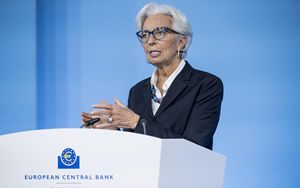(Finance) – “We raised rates by 350 basis points in a very short time, simply because we had to cover a lot of ground to reduce inflation. It’s starting to work, we just got new numbers” and both in the euro area and in Italy “total inflation has dropped”. This is the scenario traced by ECB President Christine Lagarde during a debate atPermanent observatory for young publishers, in Florence. “Obviously,” she continued Lagarde – we have to do a very sophisticated analysis of these numbers and try to break down how durable and how subject to change and volatility. To really understand what the driving forces behind price increases are and try to measure how much ground we need to cover.”
Core inflation, adjusted for energy and food, for the president of the ECB“is still significantly too high. So – he added – we still have some ground to go but we also know that there is a lot of uncertainty. The financial tensions we have observed create a sort of cloud and we must use all our analytical skills to understand what impact all this could have, of course to calibrate rates so as to bring prices down We will base ourselves on data developments but the objective is clear we want a lasting drop in inflation towards the 2% target: this is what what we must do and we will do whatever it takes.”
For Lagarde there is none no compromise between price and financial stability. “I have said very clearly that I see no compromise between price stability, which is our primary objective, and financial stability which – said the president of the ECB – is a fundamental condition for price stability. They are separate and at the same time support each other. At the ECB we have a set of tools, we have tools to intervene on price stability, at the moment mainly rates, but not only because we want to ensure that our monetary policy is transmitted to the whole system in a soft way, and we will use these tools if this does not would occur. And in the other case we have abundant liquidity and access to very large liquidity, even much larger than the Fed in terms of collateral.”
The president of the ECB illustrated the transition of the EU from a long phase of illusions to resilience. “We passed,” he explained Lagarde – from a long period of low interest rates, low inflation, perhaps too low, guaranteed supplies, that was the ‘before’, we have gone from this period of illusions to a period of what I would call resilience. We had the illusion of peace and war broke out. We had the illusion of good health and control over our destiny, and then the worst pandemic of all time hit us. We had the illusion of cheap energy and suddenly energy prices shot up. So we have gone from this period of permanent crisis, with one shock after another without precedent to resilience. I don’t think we have to be negative because when I look at what we’ve been able to do it’s pretty phenomenal. Look at energy: in February 2022 everyone was saying that there would be rationing, a terrible situation, that chemicals would be blocked, factories stopped. Instead, in a few months we managed to manage, to find alternative sources with the Americans, the Norwegians, the Middle East. And when we said it was our collective interest to save 15% of energy, we saved 20%. So wherever you look, we have gone from a beautiful illusion we were in to this phase of resilience, where we have collectively demonstrated strength – remarked Lagarde – the ability to innovate and the will to preserve Europe”.
No alarmism from Lagarde on the banking crisis front. “I would not put Credit Suisse and Deutsche Bank in the same category and I would not associate them in any way – said the president of the ECB -. In the European Union it is very unlikely that a case similar to that of Silicon Valley Bank will occur, because the banks are subject to broader and more stringent supervision. And there are many more supervised banks. In the United States there are 14 controlled and verified banks that had to implement the capital and liquidity requirements: 14 – repeated Lagarde -. many more, if I had to tell you that’s 200 banks and we verify that they have capital and liquidity requirements. There is one and a big difference. The Basel III rules on these prudential requirements were invented after the great crisis to ensure that would not happen again. And here in Europe we apply them very strictly. In the US they decided in 2018 that the liquidity requirement would not be mandatory. The system here is robust and the banks have strong capital requirements, they have strong levels of liquidity coverage. They are very closely guarded and something like what happened to Svb is very unlikely, for the reasons I just told you. And because we don’t have the same concentration that Svb had in an exclusive sector of Venture Capital and many unsecured deposits that they decided in a very short time to take away. So – he concluded Lagarde – I would say that our system is robust and very different from what we had in 2008, when there was the great crisis, and we monitor it very closely”.
